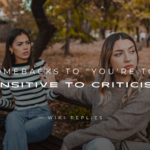Humor has a way of making us laugh, lighten the mood, and bond with others. But what happens when humor crosses the line, and someone hits you with the classic phrase: “You can’t take a joke”? Whether you’re at work, hanging out with friends, or scrolling through social media, we’ve all been there at some point. So, how should you respond when someone tries to brush off an insensitive or hurtful comment with this excuse? In this article, we’ll dive deep into understanding the phrase, offer some sharp comebacks, and explore the psychology behind it. By the end, you’ll have a toolkit of clever and confident responses to handle these situations with ease!

220+ Comebacks for “You Can’t Take a Joke”
Sarcastic Comebacks
- Oh, sorry, I forgot your jokes are the highlight of the day.
- Right, because that joke was so hilarious, I’m still laughing.
- Wow, I can hardly contain my laughter. You should consider a career change.
- Oh, I didn’t realize you were auditioning for a stand-up special. My bad.
- I must’ve missed the joke. Was it supposed to be funny?
- Yeah, I’m sure that joke will be in history books one day.
- Oh, I get it. The joke’s on me for not laughing. Well played!
- You should take your humor on tour, that’s a real crowd-pleaser.
- Wow, that was a real knee-slapper. Not.
- You’re hilarious… or at least in your own mind.
Humorous Comebacks
- Oh, I’m not crying, I just need a moment to recover from that comedy gold.
- If that was a joke, I’m definitely a fan of the ‘unfunny’ genre.
- Yeah, sure, I just need to find a laugh track for that one.
- Your jokes are like a good coffee—served cold and without flavor.
- Well, if the goal was to make me groan, you nailed it.
- I see the comedy world is still waiting for you to make your big debut.
- If that’s your attempt at comedy, I think we need to call in backup.
- Nice try, but I’m gonna need more than that to crack a smile.
- Oh, I’m laughing… inside.
- I don’t take offense. I just take that as ‘please try again’.
Playful Comebacks
- Oh, I’m sorry, I’m just not ready for that level of humor yet.
- You’re such a comedian—too bad the audience is only you.
- You know, your jokes really are… special.
- Well, I hope you’ve got more where that came from, because that one was a tough sell.
- Oh, you got me good, I’m totally shaking in my boots!
- Are you sure that was a joke? I thought it was a pop quiz!
- I can take jokes—just not that kind of joke.
- I would have laughed, but I’m still processing the deep meaning behind it.
- You should do stand-up—if you’re really into niche humor.
- It’s cool, I’ll just sit here and let that one marinate.
Intellectual Comebacks
- Humor is subjective, but that was a bit beyond my intellectual reach.
- Ah, I see you’re working on a very niche form of comedy, one for the intellectually brave.
- Jokes are meant to connect minds, not bewilder them—let’s aim for that next time.
- I appreciate the attempt, but it feels more like a thought experiment than a joke.
- You’re definitely operating on a higher comedic plane. I’ll catch up eventually.
- I didn’t know we were engaging in high-level irony. My mistake.
- That joke’s deep—almost too deep. I’ll have to research it later.
- It seems that I need to brush up on my humor theory to fully appreciate that one.
- I get it, you’re playing with absurdity—very post-modern of you.
- It’s a joke for a different intellectual class, I suppose.
Self-Defensive Comebacks
- It’s not that I can’t take a joke, it’s just that one didn’t land.
- I can take a joke, but only when it’s actually funny.
- It’s not about taking the joke; it’s about how you deliver it.
- I can totally take a joke, just not when it’s aimed below the belt.
- I’m not offended, just not amused. There’s a difference.
- I can handle humor, but I prefer jokes that don’t feel like personal attacks.
- I’m cool with jokes, just don’t make it at someone else’s expense.
- I can take a joke, but I don’t have to laugh if it’s not funny.
- I’m all for humor, but not when it’s making me feel uncomfortable.
- I can take a joke, just not the one that wasn’t really a joke.
Assertive Comebacks
- Just because it’s a joke doesn’t mean I have to laugh.
- I’m not offended, I just prefer jokes that actually land.
- I can take a joke, but not at the expense of my dignity.
- That joke didn’t hit, so let’s move on.
- I’m perfectly capable of handling humor, but this one wasn’t it.
- I’m not here to laugh at everything; I prefer quality humor.
- I’m fine with jokes, but I’m not laughing at that one.
- I’ll take a joke, but only when it’s well-timed and actually funny.
- If you want to make me laugh, try something a little less… predictable.
- I’m good with jokes, but I don’t find that kind of humor entertaining.
Witty Comebacks
- That joke’s so old, I’m surprised it didn’t need a cane.
- If I had a dollar for every time I didn’t laugh at your jokes, I’d be rich.
- I think your sense of humor is on vacation. Maybe send it a postcard?
- If I had a sense of humor like yours, I’d probably need a refund.
- That joke might have worked better in an alternate reality.
- If the joke was a race, I think it might’ve missed the finish line.
- That joke was so flat, I thought I was at an airport.
- I’m still trying to figure out if that was a joke or a cry for help.
- You almost got me—almost.
- Well, that was certainly an attempt. Points for trying!
Philosophical Comebacks
- Humor is meant to connect, not divide, so let’s make sure it brings us together.
- Isn’t the point of a joke to make us think, not just laugh? Maybe it’s time for a deeper conversation.
- Comedy often comes from truth, but not everyone is ready to hear it.
- If laughter is the best medicine, perhaps we should be more mindful of what we prescribe.
- A joke might make you laugh, but it should also make you reflect—don’t you think?
- Humor is subjective, and sometimes the line between funny and offensive is thinner than we think.
- A good joke should enlighten, not leave someone feeling less than.
- Maybe jokes are an invitation to think differently, but it depends on how we approach them.
- What if the best jokes are the ones that bring people together, not the ones that create distance?
- The best comedy challenges the way we think. Maybe it’s time for a new perspective.
Shut-Down Comebacks
- Not everything needs a reaction; let’s just leave it there.
- I don’t need to laugh to make your joke valid, but I’m done talking about it.
- If you need validation from me to feel funny, that’s your problem, not mine.
- I’m not going to engage with that. Let’s move on.
- If you think I should laugh, maybe you should reconsider the joke.
- I don’t owe you a laugh, and I’m not going to pretend I’m entertained.
- You don’t need me to laugh to prove it was a joke. Let’s just call it what it is.
- I don’t feel like discussing this anymore. Let’s end it here.
- That joke was a miss. Let’s not try to make me laugh out of obligation.
- I’m not here to entertain your need for validation; let’s leave it at that.
Mocking Comebacks
- Wow, I can totally see you as the next big comedy star. Maybe at a mime show.
- I’m sure that joke will be a huge hit—somewhere, nowhere, or never.
- Is that your idea of humor, or are you just testing my patience?
- If that’s comedy, I think we might need to rethink the entire genre.
- Oh, hilarious! You should try it in front of a mirror. It might laugh back.
- I haven’t heard a joke that bad since my last trip to the 90s.
- That was great. Almost like watching paint dry—if paint had a sense of humor.
- Is that the kind of comedy that’s reserved for those with ‘unique’ taste?
- Oh yeah, that joke’s got me rolling… or at least rolling my eyes.
- That’s a solid attempt. Too bad the audience is just you and your reflection.
Chill Comebacks
- I’m not offended, I just don’t find it funny. It’s all good.
- I’m totally fine, just not in the mood for that kind of humor today.
- It’s cool, no worries. I just didn’t laugh, that’s all.
- It’s all chill. Not every joke has to land, you know?
- I’m not upset, I just wasn’t feeling it.
- Hey, I get it, you’re just messing around, but I’m not laughing.
- It’s no big deal, just not my style of humor.
- Yeah, it’s all good. I just wasn’t into that one, that’s all.
- I’m cool with jokes, just not that one. Let’s move on.
- No worries, I’m not taking it personally. I just didn’t find it funny.
Clever Comebacks
- If I laughed at every bad joke, I’d never get anything done.
- That joke was as funny as watching a clock tick—both just as slow.
- I think I need a manual to understand that one. Was there a hidden punchline?
- Well, if that was comedy, I’d hate to see what you call tragedy.
- That was a real classic. Classic as in, from the dark ages.
- If laughter was currency, I’d be bankrupt after that one.
- You almost got me to laugh… but then I remembered it was just a joke.
- That joke was like a magic trick—now you see it, now you don’t.
- Your humor is like a good book—too bad I wasn’t interested in the plot.
- If that’s what passes for comedy, I guess we’re all in for a long ride.
Dry Comebacks
- I’m still waiting for the punchline… if there is one.
- Well, that was a joke. Definitely happened.
- I’m not sure what was supposed to be funny there, but good try.
- That joke was as dry as the Sahara. I’m good.
- If that was humor, I think I need a glass of water.
- I’m pretty sure that joke had more layers than an onion. None of them funny, though.
- Yeah, I’m really laughing on the inside.
- Well, that was something… can’t say it was a joke, but it was something.
- Dry humor, got it. I guess I’m too moist to appreciate it.
- If you think I’m laughing, it’s just a mirage.
Savage Comebacks
- If that’s a joke, then I think I’ve just witnessed a tragedy.
- That’s not a joke, it’s an attempt to lower the bar even further.
- If jokes were measured in distance, that one would have missed by miles.
- Oh, I get it now. That wasn’t funny, it was just embarrassing.
- The only thing that joke did was make me feel bad for you.
- That joke had so much potential—right up until it completely bombed.
- If that was supposed to be funny, I think you’re in the wrong business.
- I think we should call that what it is: a failure.
- If you’re trying to make me laugh, try harder—way harder.
- It’s not me not taking the joke, it’s you failing to make one.
Defensive But Confident Comebacks
- I can take a joke, I just don’t find that one worth my time.
- I’m perfectly capable of handling humor. Yours just wasn’t the kind I enjoy.
- I can take a joke, but if it’s not funny, I’m not obligated to laugh.
- I’m fine with humor, but that one didn’t quite hit the mark.
- I don’t mind jokes, just ones that don’t make me cringe.
- I’ve got a great sense of humor, but it’s selective—this one didn’t pass.
- You don’t have to explain your joke to me, but I’m still not laughing.
- I can handle humor, just not the kind that falls flat.
- I’m not upset. I just don’t have to laugh at everything to appreciate comedy.
- You can keep your jokes coming, but I’ll keep my standards high.
Jokingly Playful Comebacks
- Oh, I can take a joke! I just prefer the funny ones.
- I’m tough—bring it on. But you might want to warm up first!
- I can take jokes like a pro—just don’t be surprised if I don’t laugh at yours!
- I can take a joke… but I prefer the ones that don’t require an apology afterward.
- Oh, I get it now! Your humor’s so advanced, I just need to catch up.
- I’m just waiting for the real joke to come through!
- If I don’t laugh, it’s not that I can’t take a joke, it’s just that I’m too busy enjoying life.
- You can throw jokes at me all day, but that one wasn’t quite a bullseye.
- I can totally take a joke. Just give me one that’s actually funny next time!
- I can take a joke… just not one that’s less funny than my socks.
Classic Comebacks
- Well, I didn’t laugh, but that’s okay. Not every joke hits.
- I’ve heard worse jokes… but I’ll still be nice and pretend to laugh.
- Is that supposed to be funny? I’m not sure I’m following.
- I can take a joke, but that one missed the mark.
- Oh, I’m fine—just not laughing at that particular one.
- I see what you were trying to do there, but it didn’t quite land.
- I’ll take a joke when it’s funny. Until then, I’m just listening.
- You know, I’ve seen better jokes in fortune cookies.
- I’m not offended; I just don’t think that was a joke.
- Yeah, I get it. That was a joke… just not the best one.
Understated Comebacks
- I’m good. I just wasn’t laughing.
- Hmm. Well, that was something.
- I see what you’re doing, but I’m just not feeling it.
- Oh, I heard the joke, just didn’t laugh at it.
- Yeah, I get it. Not really my thing though.
- Okay, that was a joke. Got it.
- I didn’t laugh, but I’m sure someone did.
- I’m not really a fan, but no big deal.
- You’re trying—keep it up!
- Well, that was an attempt. Let’s see what’s next.
Bold Comebacks
- You’re gonna need to try harder if you want me to laugh at that.
- I can take a joke, but I’m not lowering my standards for it.
- I’m not here to just laugh at anything. Your joke has to earn it.
- Keep trying, but just know I’m not easily impressed.
- That joke didn’t do it, but you’ve got a few more chances.
- You’ve got to do better than that if you want me to crack a smile.
- I take jokes just fine, but I don’t settle for mediocre ones.
- I can take jokes, but they’ve got to be worth it.
- I’m not gonna lie, that one was a miss. But don’t give up yet!
- I can take a joke, but let’s aim for something with actual humor next time.
Comedic Comebacks
- Well, that wasn’t quite the comedy special I was expecting!
- That joke was so dry, I think I need some water!
- I don’t know, that joke felt more like a public service announcement than comedy.
- If that was your warm-up, I can’t wait to hear your headliner!
- I’m laughing so hard… Oh wait, no, I’m not.
- Well, that joke was a great example of what not to do.
- That joke was like a rollercoaster—slow at the start, and no real thrill.
- Was that the joke? I think I missed it while I was waiting for the punchline!
- Comedy 101: That joke was a lesson in ‘how to fail.’
- That joke is what happens when you google ‘how to make people uncomfortable.’
Sarcasm-Fueled Comebacks
- Oh, you’re hilarious—just like a rock in a pillow fight.
- Well, that was certainly… something. A very interesting attempt!
- Ah, yes, because we all know that joke is going to be the next big thing.
- That was definitely a joke. If by ‘joke’ you mean ‘awkward silence.’
- You’ve got the audience in stitches… too bad it’s just you.
- I’m so glad we’re both on the same page about your comedic genius.
- What a classic joke. You should get that one framed.
- Oh, I can totally take it! Just waiting for it to actually be funny.
- Yeah, that’s what I call comedy gold… if it was 1998.
- You should really tour with that one. It’ll be a hit… with someone, somewhere.
Self-Deprecating Comebacks
- I can take a joke, but sometimes I laugh at my own bad decisions more than that one.
- Yeah, I’m great at taking jokes… which is why I just laughed at my own life choices.
- I guess I didn’t laugh, but who needs to laugh when you’ve already got this much self-irony?
- I can take a joke, but I’m way too busy being the punchline of my own life.
- That joke was almost as good as my dance moves—almost.
- I take jokes like I take bad decisions—head-on, with no hesitation!
- I’m not laughing, but you should see the jokes I tell myself. They’re worse.
- I don’t laugh easily, unless it’s at my own expense.
- I’m good at taking jokes… just not as good at handling my own awkwardness.
- I can take a joke, I just prefer to save my laughs for the things that matter—like my crippling self-doubt.
What Does “You Can’t Take a Joke” Really Mean?
“You can’t take a joke” is often used when someone says something that might be hurtful, rude, or inappropriate but tries to justify it by labeling you as overly sensitive. It’s like they’re dismissing your feelings, making it seem like the problem is yours for not laughing at their comment.
Why People Use This Phrase
People throw out the “You can’t take a joke” card to avoid taking responsibility for their words. It’s a convenient way to shift the blame. Instead of recognizing that their comment may have crossed a line, they focus on making you seem like the one who’s being unreasonable. In reality, humor can be subjective, and just because someone finds something funny doesn’t mean everyone will.
The Impact of “You Can’t Take a Joke” on Conversations
When someone drops this phrase, it can have a powerful effect. It can make you feel belittled, unappreciated, or even alienated. It might make you second-guess your response, but don’t let it derail you. Humor is meant to be fun and inclusive, not a weapon for pushing boundaries and disregarding others’ feelings.
Understanding the Context of “You Can’t Take a Joke”
- What is Humor, and Why Do People Use it?
Humor serves as a social tool. It breaks the ice, relieves tension, and builds camaraderie. But humor also has a dark side—what one person finds funny, another may find hurtful. Understanding the context in which humor is used is essential.
- When Humor Crosses the Line: Understanding Boundaries
The line between playful banter and a hurtful comment can be thin. Some jokes may be lighthearted, while others can feel like personal attacks. The key is knowing when humor stops being fun and becomes damaging.
- The Fine Line Between Comedy and Insensitivity
The best humor comes from a place of inclusivity, not exclusion. Comedy is great when it brings people together, but it becomes problematic when it singles out or makes someone uncomfortable. It’s important to recognize when a joke moves into uncomfortable territory.
Common Situations Where You Hear “You Can’t Take a Joke”
- Teasing Among Friends
With close friends, playful teasing is often part of the fun. But sometimes, a joke can go too far, leaving you feeling hurt. When that happens, a response to “You can’t take a joke” can set the tone for how to navigate such moments in the future.
- Workplace Humor Gone Wrong
In professional environments, jokes can sometimes misfire. What’s meant as a harmless comment can come across as inappropriate or offensive, especially if it targets someone’s personal traits or beliefs.
- Online and Social Media Interactions
On social media, tone is hard to gauge, and people often hide behind their screens to make comments they might not say face-to-face. The phrase “You can’t take a joke” is commonly used in these situations, often when someone’s online comment goes too far.
The Psychology Behind the Phrase
- Why Do People Say “You Can’t Take a Joke”?
When someone says this, they are often trying to avoid feeling guilty for causing harm. It’s a defense mechanism that deflects responsibility for the comment and shifts the blame onto the person who was hurt.
- Psychological Reasons for Dismissing Offense
Some people believe that humor is meant to be “taken lightly,” and if you don’t laugh, they might feel their joke failed. This can lead them to rationalize the comment as something harmless.
- The Role of Empathy in Humor
True humor comes with empathy—it understands boundaries and respects others’ feelings. When someone dismisses your feelings with “You can’t take a joke,” they are showing a lack of consideration for how their words affect you.
How to Respond to “You Can’t Take a Joke”
- Acknowledge the Humor Without Accepting the Insult
One way to respond is to acknowledge the humor but still stand firm about your feelings. For example, you could say, “I get it, you’re joking, but that wasn’t really funny to me.”
- Use Humor to Deflect the Situation
A light-hearted, witty comment can sometimes disarm the situation without causing further conflict. For instance, saying, “Guess I’m just too sophisticated for your humor!” keeps it playful but still addresses the comment.
- Stand Your Ground and Address the Inappropriate Comment
If the joke was hurtful, it’s okay to be serious. You can firmly say, “I know you’re joking, but that comment isn’t cool. I’d appreciate if we could keep things respectful.”
- How to Use Sarcasm to Your Advantage
Sarcasm can be a clever way to turn the tables. For example, saying, “Oh, right. I’m just not on the same level of highbrow humor as you,” can make the person rethink their approach without escalating the situation.
- Don’t Be Afraid to Walk Away
Sometimes, the best response is no response. Walking away from a situation is a powerful way to avoid further discomfort, and it sends a clear message that you won’t tolerate disrespect.
Effective Comebacks to “You Can’t Take a Joke”
- The Power of a Witty Response
A sharp, well-timed comeback can turn the situation around. Try something like, “I have a great sense of humor… just not at your expense.”
- Quick One-Liners to Disarm the Situation
Quick one-liners can be both funny and effective: “Sure, I can take a joke. Just not the bad ones!”
- Turning the Tables with Humor
You can always reverse the situation: “Oh, I’m sorry. I didn’t realize I was on the set of your comedy special.”
- Funny Responses That Show Confidence Without Being Mean
Responding with confidence but without being cruel is key. You might say, “I’m sure you meant that as a joke, but let’s save the real comedy for later.”
- Using Silence as a Response
Sometimes, silence is the best comeback. The awkward pause can make the other person realize their joke may not have landed the way they thought it would.
When to Let It Go
- The Power of Letting Go for Your Own Peace of Mind
At times, it’s best to let the comment roll off your back. If the joke isn’t worth addressing, letting it go saves you from unnecessary drama.
- Knowing When to Pick Your Battles
Not every comment is worth a response. If it’s a harmless joke and you’re not deeply offended, letting it slide can help maintain the peace.
- Understanding That Not Every Joke Needs a Response
Sometimes, responding just feeds the fire. If you don’t feel it’s worth your energy, simply move on and let the comment fade into the background.
What to Do if Someone is Persistently Offensive
- Setting Boundaries: How to Stand Up for Yourself
If someone repeatedly makes offensive jokes, it’s essential to set clear boundaries. Let them know what’s off-limits and stick to your position.
- Asking for Respect Without Being Aggressive
Ask for respect calmly and assertively. You don’t need to raise your voice to make it clear that certain jokes are unacceptable.
- How to Recognize Toxic Humor
Toxic humor often comes at the expense of others, is repetitive, and undermines people’s self-esteem. Recognizing this type of humor helps you deal with it more effectively.
Conclusion
At the end of the day, humor should be fun, not a tool for putting others down. If someone tries to brush off a rude remark by saying, “You can’t take a joke,” now you have plenty of clever comebacks to set the record straight. Whether you go for something witty, sarcastic, or straight-up savage, the key is to stand your ground while keeping your cool. And if you’re looking for even more great responses, check out 220+ Comebacks to “You’re So Lucky” – Try These for more quick-witted replies!
FAQs
Q. What Should You Do If You Don’t Find a Joke Funny but Don’t Want to Be Rude?
You can politely acknowledge the humor but let them know it wasn’t to your taste. A simple, “I see where you’re coming from, but that wasn’t my style,” can keep the conversation light while setting a boundary.
Q. Can You Respond to “You Can’t Take a Joke” in a Way That Doesn’t Escalate Tension?
Yes! A calm, assertive response like, “I understand you’re joking, but I’d prefer if we kept it respectful,” can express your feelings without making the situation worse.
Q. Is It Okay to Call Someone Out on Their Humor?
Absolutely! If their humor is harmful or crosses boundaries, it’s perfectly okay to call it out. You have the right to stand up for yourself.
Q. What Is the Best Way to Respond to “You Can’t Take a Joke” at Work?
In a professional setting, a polite but firm response works best. “I know you’re joking, but let’s keep it professional,” sets the tone for a respectful environment.
Q. How Can Humor Be Used to Help You Navigate Awkward Conversations?
Humor can ease tension and break the ice. Just be mindful to keep it light and avoid crossing personal boundaries that may make others uncomfortable.










